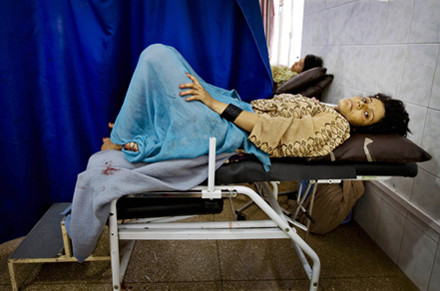IRIN, June 9, 2010
AFGHANISTAN: Maternal health needs more than healthcare
One reason for Badakhshan’s high maternal mortality rate is the lack of roads and rugged terrain, which hinder access to health facilities
Nowhere in the world are as many mothers dying from pregnancy and birth-related complications as in Badakhshan Province, northeastern Afghanistan, where maternal mortality figures are estimated at 6,000 per 100,000 live births, say agencies. Yet, the relatively peaceful province has more maternal healthcare facilities than Helmand, Zabul, Uruzgan and several others.

At least 36 percent of the population lives in absolute poverty, female life expectancy is 44, at least six out of 10 women are illiterate, under-five mortality is 257 per 1,000, and maternal mortality is 1,600 per 100,000 live births.(Photo: Kate Holt/IRIN)
For its 351,000 female population, Badakhshan has 106 midwives, 10 female obstetric experts and 73 health centres. There are also 12 mobile health clinics offering maternal health services in remote villages, according to local officials.
By comparison, in Helmand Province, southern Afghanistan, where access to health services has been limited due to insecurity, only 29 midwives, three female doctors and about 40 health centres deliver obstetric services to more than 450,000 women.
One reason for Badakhshan’s high maternal mortality rate is the lack of roads and rugged terrain, which hinder access to health facilities.
“Whenever anyone suffering from health complications [is] restricted from accessing healthcare due to geographical obstacles, the risks of mortality increase,” Eric Laroche, assistant director-general for health action in crises at the UN World Health Organization (WHO), told IRIN.
Access is particularly difficult in winter, when floods and avalanches prevent people from travelling to clinics even by donkey or horse.
To mitigate the problem, mobile healthcare providers are deployed to remote areas. Such clinics are important, say experts, but the country needs more roads.
“Maternal mortality is our national problem. It’s not just a health problem and it cannot be tackled only through health intervention,” said Saadia Fayeq Ayubi, director of reproductive health at the Ministry of Public Health (MoPH).
“We need to build roads and eliminate illiteracy, poverty, gender violence and prevent child marriage and also raise public awareness about the risks of multiple and short-term pregnancies.”
Spending problems
The UK-based Save the Children has ranked Afghanistan the “worst” place in the world for pregnant women and the UN Children’s Fund has described the country as "the most dangerous place to be born".
At least 36 percent of the population lives in absolute poverty, female life expectancy is 44, at least six out of 10 women are illiterate, under-five mortality is 257 per 1,000, and maternal mortality is 1,600 per 100,000 live births.
“The health sector in general is being funded less and less, and within that activities for maternal health are funded even less again,” said Laroche.
The health sector received about 6 percent of the total US$36 billion donors spent on rebuilding and development projects in Afghanistan in 2002-2009, according to the Ministry of Finance.
MoPH officials, however, said the real problem was not little funding but ineffective spending and a lack of national institutional capacity.
“Donors give money to NGOs and other implementing agencies and the role of the MoPH is only symbolic,” said Ayubi, adding that her department was unaware how much was spent on reproductive health by donors.
“Our capacity is extremely low and we don’t monitor projects implemented by foreign agencies,” she said.
WHO said it was working with the MoPH and other partners to formulate Afghanistan’s new reproductive health strategy. The 2006-2009 strategy set ambitious targets for the overall improvement in maternal health.
“I think we achieved some 40 percent of the [2006-2009] strategy’s targets but the rest of it remained on paper,” said Ayubi. The new strategy had to take into account all the diverse needs of maternal health in Afghanistan or the crisis would remain unbridled, she said.
Characters Count: 4905
